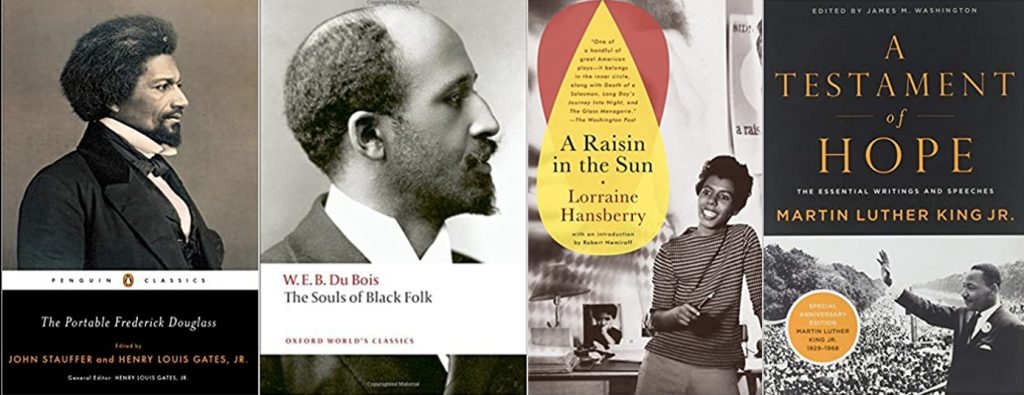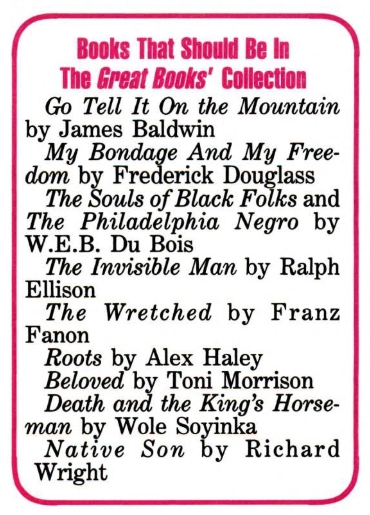
Here are four books that Torrey Honors officially recommends, and by “officially” I mean that we have built them into the heart of our great books program. So we will be cycling through them every year with students, because they are proven masterpieces that bear careful reading and re-reading.
- Narrative of the Life of Frederick Douglass and several speeches, from The Portable Frederick Douglass. The classic 1845 autobiography takes readers on the journey of Douglass’ self-education, escape to freedom, and rise to influential statesmanship. His essays, meanwhile (including “What to the Slave is the Fourth of July?”), let us hear the public voice of an orator who changed our country.
- W.E.B. DuBois, The Souls of Black Folk (1903). In this unique masterpiece of social analysis, DuBois probes the meaning of the African American experience and culture and generates explanatory categories (most famously the “double consciousness”) which have proven increasingly relevant.
- Lorraine Hansberry, A Raisin in the Sun (1959). Hansberry works that ancient magic of the playwright: She puts on stage the specifics of one little family’s particular life (in segregated mid-century Chicago), and somehow shows her audience universal truths about justice and dignity.
- Martin Luther King, Jr., A Testament of Hope (selected writing and speeches). Especially when we are in a position to read King as a culmination and application of the tradition of African American classics that have gone before him, we can appreciate more deeply the biblical case for civil rights and equality that he made to the American people.
We’ve read Douglass in Torrey for as long as I can remember; King and DuBois have been on the reading lists of the two separate houses of Torrey for some time, meaning that only half of our students got either author. We’ve recently consolidated our curriculum, though, so now all students will read both MLK and DuBois. Hansberry is brand new for us this year, and her inclusion is a direct result of very extensive faculty conversations over the last few years: we move slowly, but we move.
(An aside to Torrey Honors alum who didn’t get to read all four of these with us: Sorry! We added books after you left. Remember that as a perpetual member you have the right to read and dispute in perpetuity.)
Torrey Honors is a great books program, which means we read and discuss a big stack of time-tested classic texts as our way of providing the general education component of our students’ college work. We start with Homer’s Iliad and and just keep arguing about great books for four years, ending up somewhere in the middle of the twentieth century. Like a lot of great books programs, we’re strongest in the oldest stuff, maybe down to about the Renaissance and the Reformation. Unlike a lot of great books programs, we especially emphasize reading and discussing the Bible, and we read a lot of classic Christian theology.
The great books educational movement at large has attracted plenty of African American students excited to continue down the Homer-Plato-Augustine-Dante-Shakespare trail, but it’s only fair to say that the great books movement has also had its share of problems, and caused its share of problems. I cringe to recall the 1990 debacle in which no less a spokesman that Mortimer Adler was asked why the Britannica Great Books set, even in its latest revision, could find no room for a single African American writer in its 60 volumes: The argument was that truly great books had to have lots of ideas in them, and universal ideas, but black authors had so far only written about one or two ideas at a time. Adler mused, “I think probably in the next century there will be some Black that writes a great book, but there hasn’t been so far.” Big yikes, as the kids say. Read all about it in JET magazine if you want, along with excoriating counter-arguments from scholars like Henry Louis Gates, Jr.

And even better than the counter-arguments, consider the counter-examples: works by Anna Julia Cooper, Zora Neal Hurston, Richard Wright, Toni Morrison, Gwendolyn Brooks, James Baldwin, Ralph Ellison, Robert Hayden, etc. There is no need to wait for the next century. There are some masterpieces and classics already here to consider. There are lots of ideas in these books, layers on layers, good measure pressed down and shaken together.
In Torrey, we tend to prefer older books, because we want to harvest the testimony of multiple generations rather than the testimony of just a few recent decades; we want books that have been argued over for centuries if possible, generating whole schools of thought contending over who’s reading it right. When we read anything from the 1950s or so, it needs a special justification: it better be our personal friend C.S. Lewis, or superbrain T.S. Eliot or somebody. In the case of our curricular sub-thread of African American books, we’ve currently got the four books at the top of this post. They do extend into the mid twentieth century, which is very recent by our standards. The main reason we read them is that they’re great books. We’re also eager to give special attention to America, which is where we are and which is a young nation by great books standards. We’re also eager to give special attention to the culture-forming power of Christian ideas, which breaks through with special clarity in MLK’s extension of the oratorical tradition that we first plucked in Douglass. And finally we acknowledge the unique status of the African American self-understanding as a central element of American self-understanding.
But mainly, we want to read these modern classics, and re-read them, with the students who come through our program.